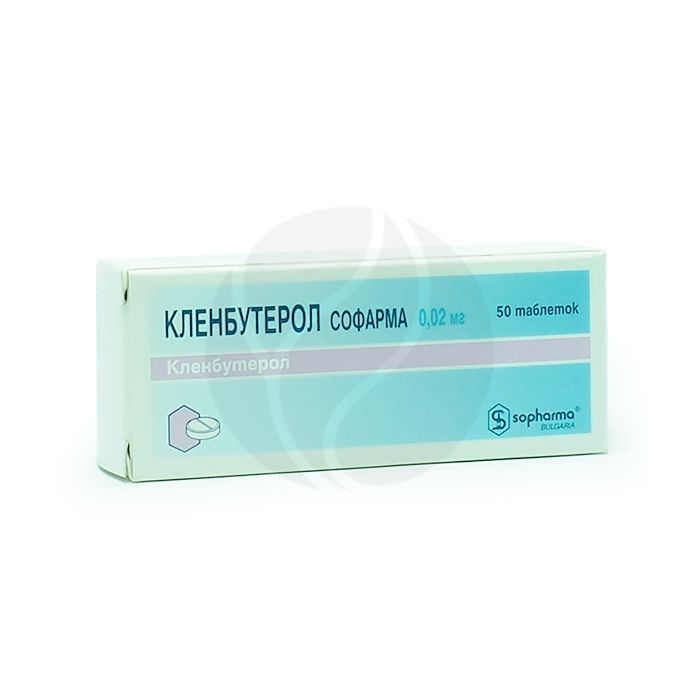Clenbuterol tablets 0.02mg, # 50
Expiration Date: 05/2027
Russian Pharmacy name:
Кленбутерол таблетки 0.02мг, №50
COPD
broncho-obstructive syndrome,
bronchial asthma.
The method of application and dosage regimen of a particular drug depends on its form of release and other factors. The optimal dosage regimen is determined by the doctor. It is necessary to strictly observe the compliance of the used dosage form of a particular drug with the indications for use and the dosage regimen.
Inside. The dose and the regimen of administration, the duration of therapy are determined individually, depending on the indications, the clinical situation, the patient's age and the dosage form.
Active ingredient: clenbuterol hydrochloride - 0.02 mg
Excipients: lactose monohydrate 70 mg, wheat starch 31.48 mg, microcrystalline cellulose 48.5 mg, colloidal silicon dioxide 2 mg, magnesium stearate 2 mg, povidone (povidone K25) 6 mg.
Hypersensitivity to clenbuterol;
thyrotoxicosis, tachyarrhythmia;
hypertrophic obstructive cardiomyopathy;
myocardial infarction (acute phase), severe coronary artery disease;
pregnancy (I and III trimester), lactation (breastfeeding);
children's age - depending on the dosage form.
With care: hyperthyroidism, a history of myocardial infarction, ischemic heart disease, arterial hypertension, prostatic hypertrophy, diabetes mellitus, II trimester of pregnancy.
Clinical and pharmacological group: Bronchodilator - beta2-adrenergic agonist
Pharmaco-therapeutic group: Beta2-selective adrenergic agonist
pharmachologic effect
Bronchodilator, is a long-acting ?2-adrenergic receptor stimulant. The bronchodilator effect is due to a direct relaxing effect on the muscles of the bronchi. May slightly increase heart rate. It also has a tocolytic effect.
Pharmacokinetics
After oral administration, it is rapidly and completely absorbed from the gastrointestinal tract. It is metabolized to an insignificant extent in the liver, resulting in the formation of 8 metabolites that do not have pharmacological activity. Plasma is released in two phases. T1 / 2 of the first phase is 1 hour, the second - 34 hours. For the most part, it is excreted from the body unchanged by the kidneys, while 87% of the dose taken is excreted within 168 hours.
Indications
COPD
broncho-obstructive syndrome,
bronchial asthma.
Dosage regimen
The method of application and dosage regimen of a particular drug depends on its form of release and other factors. The optimal dosage regimen is determined by the doctor. It is necessary to strictly observe the compliance of the used dosage form of a particular drug with the indications for use and the dosage regimen.
Inside. The dose and the regimen of administration, the duration of therapy are determined individually, depending on the indications, the clinical situation, the patient's age and the dosage form.
Side effect
From the side of the cardiovascular system: palpitations, tachycardia, decrease or (more often) increase in blood pressure.
From the nervous system: a feeling of fear, mental disorders, hyperkinesis, sleep disturbance, headache, facial redness, sweating, trembling and anxiety, dizziness; people with Parkinson's disease may experience increased tremors and muscle rigidity.
From the digestive system: dry mouth, nausea.
From the side of metabolism: in patients with diabetes mellitus, hyperglycemia is possible.
From the musculoskeletal system: urinary retention associated with spasm of the renal vessels and the sphincter of the bladder.
Allergic reactions: skin rash, urticaria.
Others: hypokalemia.
Contraindications for use
Hypersensitivity to clenbuterol;
thyrotoxicosis, tachyarrhythmia;
hypertrophic obstructive cardiomyopathy;
myocardial infarction (acute phase), severe coronary artery disease;
pregnancy (I and III trimester), lactation (breastfeeding);
children's age - depending on the dosage form.
With care: hyperthyroidism, a history of myocardial infarction, ischemic heart disease, arterial hypertension, prostatic hypertrophy, diabetes mellitus, II trimester of pregnancy.
Application during pregnancy and lactation
Use is contraindicated in the first and third trimesters of pregnancy. Application in the II trimester of pregnancy is possible only in cases where the intended benefit to the mother outweighs the potential risk to the fetus.
If necessary, use during lactation should decide on the termination of breastfeeding.
Application in children
It is possible to use in children according to indications, in doses and dosage forms recommended according to age. It is necessary to strictly follow the instructions in the instructions for clenbuterol preparations for contraindications to the use of specific dosage forms of clenbuterol in children of different ages. The dose for children is calculated depending on age and body weight.
special instructions
When treating patients with diabetes mellitus, it is necessary to periodically monitor the level of glucose in the blood. The use of clenbuterol can lead to an increase in body weight due to the presence of an anabolic effect, and when administered to athletes, clenbuterol can cause a positive result during doping control.
During treatment with clenbuterol, resistance and 'rebound' syndrome may develop.
Influence on the ability to drive vehicles and use mechanisms
Due to the possibility of tremor, dizziness and weakness, during the period of treatment with clenbuterol, it is necessary to refrain from performing potentially hazardous activities that require special attention and quick reactions (driving and other vehicles, working with moving mechanisms).
Drug interactions
Beta-blockers are pharmacological antagonists of clenbuterol and can reverse its action.
Clenbuterol reduces the effect of hypoglycemic agents. Increases the risk of developing intracardiac conduction disorders while prescribing with MAO inhibitors and theophylline. Increases the toxicity of cardiac glycosides and increases the risk of developing arrhythmias. In combination with sympathomimetic agents, there is a mutual increase in toxicity.
Clenbuterol reduces the effect of hypoglycemic drugs.
Clenbuterol reduces the effectiveness of antihypertensive drugs.
The effect of clenbuterol is potentiated by tricyclic antidepressants, beta-adrenomimetics and anticholinergics.
Halothane and other halogenated hydrocarbon anesthetics, as well as cyclopropane, may potentiate the proarrhythmogenic effect of clenbuterol.

